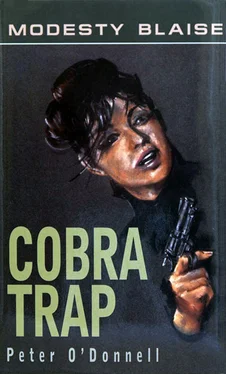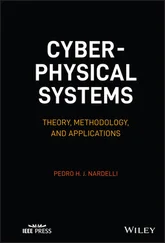At the door she stopped, turning her head to look at him. "I did. I took part in trying to kill her. Kill you both. And she just says go away and start a new life. Don't you hate me? Don't you want to do something… for revenge?"
Willie scratched his ear, searching for an answer. Then he glanced towards the bunk where Bellman lay. "No," he said. "Look where it gets you."
The stretch of road where the killing was to take place formed one of the long curves that wound through the Sierra de Yeguas on the way to Malaga. Two miles north, an open Land-Rover moved steadily through the dusk shrouding the wooded hills. The driver, Macanaz, was an experienced minder who had lived in Chicago for fifteen years and learnt his craft there. For the past two years he had been employed by the man who now sat in the passenger seat beside him.
Kaltchas was fifty years old, half Greek, half Spanish and wholly cosmopolitan; a short square man, enormously rich, who had lost his wife and family to a poorer and less busy man ten years ago. Since then he had lived a reclusive life in one or other of his homes in different parts of the world, using the modern wonders of electronic communication to carry out the various business operations that were his sole interest now.
Half an hour ago he had left his home and staff of servants in the remote and beautiful house he had built outside the small village of Vanegas. His presence was required in Brussels next day, where his financial backing would ensure the four billion pound hostile takeover by a European consortium of British Chemicals Ltd, the largest corporation of its kind outside the United States.
Kaltchas was a suspicious man, mistrustful, slightly paranoid. Aware of strong opposition to the takeover, he did not put it past his opponents to attempt some sort of delaying action by preventing his arrival at the Brussels meeting. Matters were finely balanced, and even a twentyfour hour delay could shake the market and create uncertainty in the consortium. It was for this reason that he had chosen to disguise his departure by travelling to the airport in the hired Land-Rover rather than in one of his limousines. Being a man who thought well ahead, he had made the arrangement some days ago, but was unaware that it had quickly become known to parties who were deeply interested in his travel plans though unconnected with the threatened corporation.
At the wheel, not taking his eyes from the unlit road, Macanaz said, "Are you okay, boss?"
"I'm okay." Kaltchas pulled the cap down more firmly on his head and buttoned the collar of the bomber jacket he wore.
The road was winding downhill now, with the rock from which it had been cut rising sheer on the right, the ground on the left sloping steeply down from the edge, thick with scrub and bushes. Across several curves of the road ahead as it dropped steadily down, Macanaz could see the four red lamps marking the stretch where the road was being widened by cutting deeper into the rock, for at the far end was a dangerous bend where the drop on the left became long and sheer.
Here, in the newly widened strip, an immobilised bulldozer was parked, tools were stored in locked metal sheds, and a mobile crane stood at each end of the working area. Macanaz slowed to thirty k.p.h. as he approached, headlights on beam, alert for any sign of movement amid the cover provided by the roadworks equipment. Beside him, Kaltchas slid a finger through the triggerguard of the revolver on his lap. It was as they passed the first crane, its derrick leaning out over the road, that a figure dropped from the top of the derrick, a blackclad figure wearing a skimask.
The timing was perfect. Ropes attached to the ankles brought the falling figure to a halt in the same instant that two arms wrapped round Macanaz's neck and snatched him bodily from the moving vehicle. Kaltchas, peering to the nearside, heard nothing and was unaware that Macanaz had vanished until the Land-Rover began moving towards the edge and he turned his head to give warning.
Unbelievably for him, the driving seat was empty. The shock was huge, and he snatched at the wheel with one hand, trying to steer a safe course while he manoeuvred himself into position to reach the brake. Then came new shock as he passed the metal toolsheds, for he glimpsed a dark figure seeming to soar over one of the sheds and drop towards the vehicle, landing behind him as it moved on down the slope.
The second nightmare shock was the last emotion Kaltchas was ever to know, for a hand with a hardened edge struck him sharply on the back of the neck. As he slumped, barely conscious, the man who had hit him leant forward and took the wheel with gloved hands. Macanaz had put the Land-Rover in a lower gear for the descent, but with the increased slope at this point it was steadily gaining speed. When it reached the second crane it was no more than thirty paces from the bend where the ground fell away sheer.
A third figure, identical to the others, dropped from the derrick, ropes strapped to ankles, hands reaching down. The man in the back of the Land-Rover released the wheel and reached up at the precise moment his companion fell. Hands locked on wrists and the vehicle sped on with its lone occupant, smashed through the light wooden barrier and seemed to leap out over the edge of the drop. Seconds later there came the sound of an explosion and the darkness was lit by a glare from below.
The man who had steered the Land-Rover dropped to the ground. His companion doubled forward, pulled himself up one of the ropes hand over hand, sat at the top of the derrick to unstrap his ankles, then came down to the road carrying the ropes. Together the two men moved back to the toolsheds, where the man who had snatched the driver from his seat now waited. One of them said to him, "Macanaz?"
"Alive as per contract," came the answer, "but unconscious. He will not know what happened." They spoke in English but said no more as they moved behind the sheds and disassembled the small trampoline used by the second man for his soaring leap. With its pieces distributed between them they moved across the road and set off down the steep scrubcovered slope, heading across country to the car they had left hidden in woods two miles away.
* * *
They called themselves The Dark Angels. This was not for publicity reasons since it was vital that their existence should not be known. They called themselves The Dark Angels and thought of themselves as The Dark Angels as a means of establishing their selfimage, which in turn was a means of enhancing their special abilities to a remarkable degree.
When planning or executing an operation they took on their professional personas and used only names suited to those personas, names from the hierarchy of demonology—Asmodeus, Belial, and Aruga. They were men in their middle twenties, highly trained in combat and firstclass gymnasts.
If it is possible to be strong in character without affection, compassion or humanity, then they were strong in character, but they were also rejects from the elite units of the armed forces, whose psychologists had classified them as psychopaths.
They worked exclusively for a small nonprofitmaking organisation in the City of London.
* * *
It was midafternoon of a spring day when the phone in Modesty Blaise's penthouse bedroom rang. She was under the shower in the bathroom and her houseboy, Weng, was foodshopping in Soho. Turning off the water she picked up a towel and called, "Danny, answer that for me, please."
In the bedroom, fresh from his shower and dressing now, Danny picked up the phone and said, "Can I help you?"
A man's voice said, "Oh, I'm calling Modesty Blaise. Is that you, Weng?"
Читать дальше












